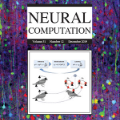The highly irregular spiking activity of cortical neurons and behavioral variability suggest that the brain could operate in a fundamentally probabilistic way. Mimicking how the brain implements and learns probabilistic computation could be a key to developing machine intelligence that can think more like humans. In this work, we propose a theory of stochastic neural computing (SNC) in which streams of noisy inputs are transformed and processed through populations of nonlinearly coupled spiking neurons. To account for the propagation of correlated neural variability, we derive from first principles a moment embedding for spiking neural network (SNN). This leads to a new class of deep learning model called the moment neural network (MNN) which naturally generalizes rate-based neural networks to second order. As the MNN faithfully captures the stationary statistics of spiking neural activity, it can serve as a powerful proxy for training SNN with zero free parameters. Through joint manipulation of mean firing rate and noise correlations in a task-driven way, the model is able to learn inference tasks while simultaneously minimizing prediction uncertainty, resulting in enhanced inference speed. We further demonstrate the application of our method to Intel's Loihi neuromorphic hardware. The proposed theory of SNC may open up new opportunities for developing machine intelligence capable of computing uncertainty and for designing unconventional computing architectures.
翻译:暂无翻译





